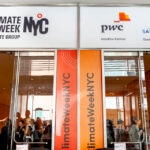New York Climate Week, held alongside the United Nations General Assembly during the last week of September, has confirmed its status as a key venue—second only to the COPs—for advancing the global sustainability agenda.

There have been claims that geopolitical tensions, war, uncertainty, turbulence ain world trade and the anti-ESG movement are sidelining sustainability, and some voices even speak of “the beginning of the end.” The gathering in New York demonstrates that sustainability is more vital than ever. And this is because sustainability is becoming more economically viable every day. Those of us present observed that sustainability is becoming more closely tied to competitiveness, as highlighted in the Draghi report. Even if there is a shift in political leadership following the US election, the implementation of the Inflation Reduction Act is likely to remain largely unaffected, though it could temporarily hinder global climate governance efforts.
Today, we are progressing toward a dynamic form of sustainability, marked by new challenges and opportunities. These topics have taken center stage in many of this week's conferences and events, shaping this new phase.
Sustainability is becoming more economically viable every day
First, the business sector's commitment and progress were reaffirmed. The Alliance of CEO Climate Leaders , comprising over 130 global companies with total revenues of $4 trillion, has successfully grown revenues by 18 percent while collectively reducing emissions by 10 percent from 2019 to 2022. Regarding the financial sector, the Net Zero Banking Alliance, consisting of 144 banks globally, has released a progress report indicating that 97 percent of member banks have established intermediate targets for the most emissions-intensive sectors.
However, it was also emphasized that we are just beginning and thus need to innovate, scale up, and accelerate our efforts. Transforming the energy and production system we've developed since the mid-19th century is a monumental task. As highlighted by McKinsey during one of its conferences, only 10 percent of the technologies required for a net-zero emissions energy system are currently deployed at the necessary scale. As President Biden remarked at the Bloomberg Business Forum in New York, "It’s the perfect time to go big... believe in possibilities."
Only 10 percent of the technologies required for a net-zero emissions energy system are currently deployed at the necessary scale
And this brings us to the third core element of this new phase of sustainability. Private sector companies are expected to contribute 80 percent of the investment needed for transforming our world. For these investments to happen, a crucial prerequisite is a regulatory environment that facilitates them. This includes ambitious, clear, and predictable industrial climate policies, demand policies with appropriate incentives for innovation in emerging clean technologies (cleantech), streamlined processes for scaling up available technologies, and complete integration of a just transition. Only then can the financial sector fulfill its fundamental role in this transformation, which is to facilitate the mobilization of financial resources so that companies, institutions, and families can invest in sustainability. During the week, we've observed that an increasing number of companies are joining the urgent call for governments to establish this enabling environment for investment.
Another important element in this new phase of sustainability is the role of alliances, which were a major topic in New York. These alliances are increasingly crucial for tackling this issue on a comprehensive and global scale. Cross-sector alliances are essential for addressing converging challenges, and public-private partnerships enable us to achieve goals that neither sector can accomplish alone. Blended finance is a prime example of this momentum, offering financial solutions that combine public financing and guarantees to scale private capital and mobilize more financial resources, particularly in emerging countries. Additionally, sector-specific alliances are instrumental in addressing sustainability challenges. A concrete example is the alliance announced in New York between BBVA and KKR, aimed at addressing the significant investment required for infrastructure projects with a high environmental and social impact.
Finally, that week reiterated the importance of having transformational leadership guiding our governments and companies to drive systemic change. As Ortega y Gasset noted, “it is only possible to progress when you think big; it is only possible to advance when you look far ahead.” We need leadership that is visionary, recognizes the role each of us plays, has the courage to confront enormous challenges, and remains steadfast in its mission and objectives.
We are making progress, but we must accelerate our efforts
If I were to summarize the five elements I've observed this week in a few brief lines, I would say that we are making progress, but we must accelerate our efforts. There's a pressing need for governments to establish a favorable environment for investment. We all need to come together and collaborate for systemic change, supported by alliances and leadership that rise to the challenge.

Session about "Low emission steel supply chains: prospects and progress" at the New York Climate Week.